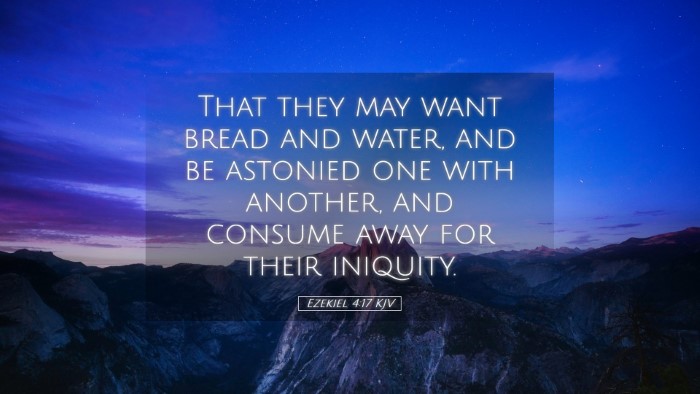Ezekiel 4:17 Commentary
Verse Reference: Ezekiel 4:17 - "That they may want bread and water, and be dismayed one with another, and consume away for their iniquity."
Introduction
Ezekiel 4:17 stands as a pivotal verse within Ezekiel's prophetic narrative, reflecting God's judgment against Israel for their continued disobedience and sin. This verse encapsulates the gravity of their situation, both physically and spiritually, as it highlights the impending famine and the resultant despair that sin brings upon a nation.
Contextual Background
This chapter (Ezekiel 4) is part of a series of symbolic actions performed by the prophet Ezekiel, which serve as vivid illustrations of the spiritual and physical state of Israel. As a predominately socio-political entity in the ancient Near East, Israel's infidelity to Yahweh has dire repercussions that Ezekiel is called to communicate.
Historical Significance
The setting for Ezekiel's message is during the Babylonian exile, when Judah is facing catastrophic judgment. The previous chapters have established the themes of sin, idolatry, and the consequences of turning away from God, which are further emphasized in this verse.
Thematic Insights
- The Reality of Judgment: The verse explicitly connects the physical needs of the people—bread and water—with their spiritual state. Matthew Henry notes that divine judgment results in a deprivation of essential needs, serving as a consequence of disobedience.
- Covenant Relationship: Albert Barnes elaborates on the covenant implications, stating that the people's suffering reflects their breach of covenant with God. Their physical state mirrors their spiritual barrenness, illustrating a profound disconnect between the people and their Creator.
- Community Despair: The phrase "dismayed one with another" emphasizes the communal aspect of suffering. Adam Clarke points out that a collective failure leads to collective punishment, suggesting that individual iniquities can have widespread effects within a community.
- Spiritual Consumption: The last part of the verse, "consume away for their iniquity," signifies spiritual decay. As they face external hardship, their internal state deteriorates due to guilt and shame over their sins, which Clarke states can lead to even greater despair—a psychological suffering parallel to their physical hunger.
Interpretative Analysis
The interpretation of Ezekiel 4:17 must navigate both the literal and metaphorical implications of want and despair. The hunger for bread and water can be seen as a physical allegory for unmet spiritual needs. In a theological analysis, the necessity for sustenance becomes a plea for a return to faithfulness.
Spiritual Hunger
Pastoral applications can extend from this passage, recognizing spiritual hunger in the life of believers today. This disarray serves as a warning, echoing through time. As believers seek to nourish their spirits, neglecting the divine sustenance that comes through God’s word and relationship can lead to similar consequences.
Practical Applications
- Encouragement for Repentance: The verse implores listeners to turn from iniquity. Just as the people of Israel faced famine as a result of their sins, modern congregations are reminded that repentance can restore their relationship with God.
- Community Support: As "dismayed one with another" indicates the impact of communal sin, it invites church communities to support each other in their spiritual journeys. This emphasizes the importance of accountability and fellowship in faith.
- Awareness of God’s Judgment: Acknowledging the reality of God’s judgment is crucial for spiritual health. The fear of being consumed by iniquity should provoke a serious response towards holiness and obedience within one's personal life and community.
Theological Reflection
This verse offers deep theological reflection on the nature of sin and its consequences. The interplay of physical and spiritual distress highlights a profound truth: disobedience fundamentally disrupts the intended harmony between humanity and God. Understanding this relationship is critical for both pastors teaching their congregations and theologians pondering the implications of divine judgment.
Conclusion
Ezekiel 4:17 serves as a stark reminder of the realities that beset a people who turn away from God. It highlights the interconnectedness of spiritual and physical needs, leaves lessons on community and personal accountability, and calls for a humble return to faithfulness and repentance. The insights derived from esteemed commentaries underscore the persistent relevance of Scripture in addressing both ancient audiences and contemporary believers.


